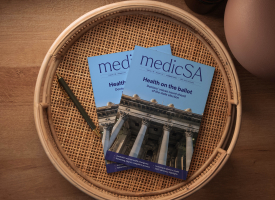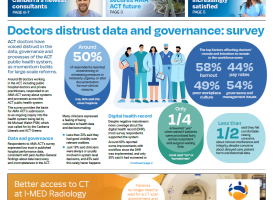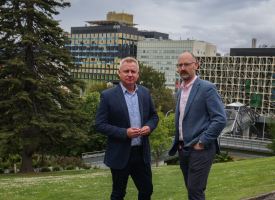Transcript - AMA President Dr Omar Khorshid on RN Breakfast
Transcript: AMA President, Dr Omar Khorshid
Outlet: ABC Radio National, RN Breakfast, Friday, 5 November 2021
HOST: Sally Sara
SALLY SARA: Well, a question that many of us are thinking about: will our hospitals be able to cope as the country starts to reopen? Well, according to the country's peak medical body, the outlook is worrying. The AMA has just released its annual public hospital report card, and says, despite a lull in hospital admissions last year, wait times for surgery and in emergency departments have blown out, and the situation is unlikely to improve in the near future. Dr Omar Khorshid is the President of the AMA, and joins us from Perth. Dr Khorshid, welcome back to Breakfast.
OMAR KHORSHID: Yeah, good morning, Sally.
SALLY SARA: You've called what's happening in the public hospital system a crisis. What is it that's worrying you most?
OMAR KHORSHID: Well, what this report card shows is that even at a time when Australia was in lockdown and admissions through emergency departments and elective admissions dropped away, our public hospital performance in some cases decreased; in others, only improved a tiny bit, in the best possible of circumstances when demand really dropped away. And what we've seen since then, of course, is demand’s really picked up in every state and territory, and hospitals have been bursting at the seams ever since. So this report card is really, I guess, disappointing, because even in the best possible scenario, hospitals struggled, and we know that it's so much worse now. So what that says for the future is that we just don't have the capacity to deliver good, quality health care when people need it. And that's regardless of COVID. Forget COVID demand. Just in the normal course of events, we just don't have the capacity for our public hospital system to deliver.
SALLY SARA: What kind of difference are you seeing between the states?
OMAR KHORSHID: Really quite substantial. So where you live in this country does determine your access to elective surgery, whether you may be waiting extraordinary long times for non-urgent surgery, which, of course, includes pretty urgent things like hip and knee replacements that really affect people's quality of life. And similarly for emergency departments, if you live in New South Wales, for instance, the system has been, before COVID, performing quite well, of course, different since the Delta epidemic. And, you know, compared with our worst performing territories, for instance, where the performance is much worse and you're much more likely to be not seen within 30 minutes, for instance, if you come in with an urgent problem, such as very severe pain or bleeding from an injury.
SALLY SARA: When it comes to emergency departments, in 2020, only 69 per cent of Australians were treated within four hours in emergency departments. How much of that is a measure or an indicator of what's going on in the system?
OMAR KHORSHID: So we have these targets, which have been put in place and other things that we measure, and they're all indicators of overall performance. And when it comes to things like this four hour rule for performance, what it says is that the overall hospital system is struggling, not just the emergency department, even though it's an emergency department measure. When a hospital is full, doctors in the emergency department can't get people out of their ED into the hospital, and so therefore they get stuck there. So it's not- it wasn't treated within four hours. It's not- wasn't- it's that people weren't brought up to the main hospital or sent home within that four hours. And that's just another sign, similar to the ambulances parked outside the ED front doors, it's another sign of a system that is absolutely full almost all the time, before we've had any peaks in demand such as flu seasons or COVID pandemics.
SALLY SARA: And what about some of the longer-term picture? When we look at the number of beds for the number of Australians aged over 65, which, again, is one of those key measures of capacity, what's that showing us?
OMAR KHORSHID: Well, that's a pretty worrying trend. So we've tracked now 27 years in a row of a decline in the number of beds per head of population over 65. And of course, those over 65s are the people by far the most likely to access our public hospital system. And that number has halved since the early 1990s. Now some of that is quite reasonable, because, of course, our hospital system’s gotten better in how we treat things. We've got new surgeries, new drugs, which means people don't need to stay in hospital as long. But of course, you reach a tipping point where the system just doesn't have the capacity. And as the baby boomer ages, and as we keep people alive with conditions that would have killed them in the past, it's causing a perfect storm of demand, which our system just hasn't evolved to be able to cope with.
SALLY SARA: Dr Khorshid, a lot of Australians at the moment, are now looking as to when they will get their third dose of the COVID vaccine. There are some reports of GPs giving out booster shots to people who haven't yet waited six months. Is that advisable?
OMAR KHORSHID: It's certainly not going to be dangerous to have your booster shot early, but it is actually wasting that dose of vaccine. We know that immunity holds up pretty well to six months, and does seem to drop away a little bit. So, our recommendation will certainly be that people wait their six months. And certainly in the case of those states where there is no COVID at the moment, the urgency of rushing out and getting your booster dose before your six months really isn't there. That situation, of course, may change once COVID starts to enter those states where they don't have any at the moment.
SALLY SARA: New South Wales has pushed forward some of its booster vaccination schedules saying that the state's really awash with doses that could run out of date. Is that advisable on the big picture?
OMAR KHORSHID: Well, I think what we're hoping for is that we'll actually see the vaccines available for younger children fairly soon. We're seeing moves in the US in that direction, and certainly hoping that our regulator will say yes as well. And that means that we may be able to use these vaccines for a broader group of people - being those aged under 11 and down to five. But certainly, it is better that vaccines go into arms than go into the bin. And we would certainly be supportive if people haven't quite reached the six months but the vaccines are going to go in the bin, well, it seems pretty common sense to make sure they get used.
SALLY SARA: Dr Khorshid, we're seeing some opening-up for international travel into Australia and also the removal of some border restrictions, particularly between New South Wales and Victoria. Given the picture that you've painted about painted about the difficulties in the health system, how concerned is the AMA about the health system’s ability to cope if case numbers rise further?
OMAR KHORSHID: We've been very concerned for a long time about whether our hospital system will be the handbrake on the economy and the handbrake on the state's capacity to deal with COVID. It's actually been far better in New South Wales - in particular Sydney - than everyone was expecting in terms of the effectiveness of the vaccines, at really limiting the spread of the virus once Sydney started to open up. Obviously, a little different in Melbourne where they opened up with far more cases and so the hospital system is still under extreme pressure in Victoria. But it's those states that haven't had COVID, that haven't been tested yet, where we're most concerned. Because they're full now - certainly my own home state of WA - full without any COVID. And it's just very hard for doctors and nurses on the front line who are already really struggling with the demand to imagine what things are going to be like once we open up. And that's why a really high vaccination target for states like WA does make sense, and it's really incumbent on everyone to go and get vaccinated so that if you do get sick with whatever, whether it's a heart attack, a stroke or appendicitis, if you get sick, you want your public hospital system to be there for you. So, let's protect it by all getting vaccinated.
SALLY SARA: Dr Khorshid, thanks for joining us again on Breakfast.
OMAR KHORSHID: Cheers Sally.
SALLY SARA: That's Dr Omar Khorshid, President of the Australian Medical Association.



